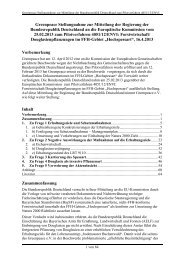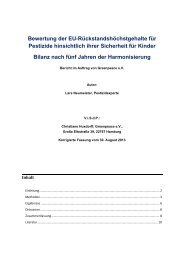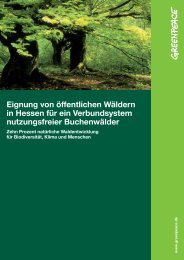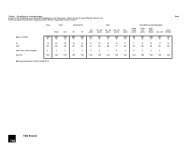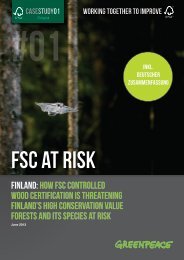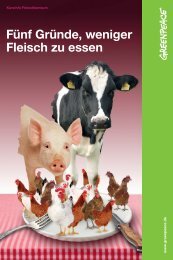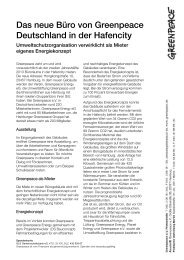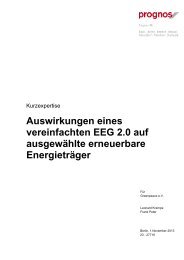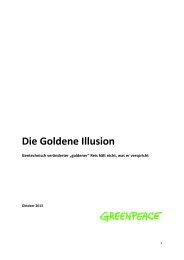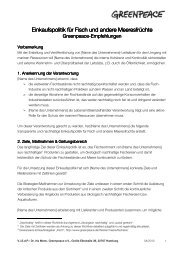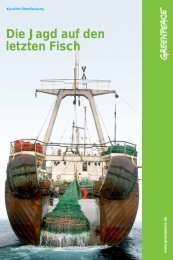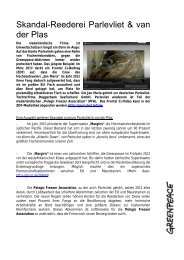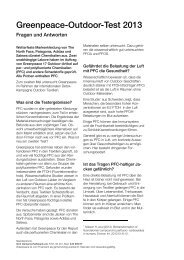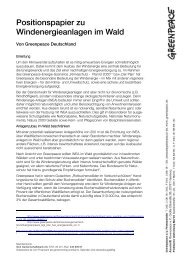Untitled - Greenpeace
Untitled - Greenpeace
Untitled - Greenpeace
Create successful ePaper yourself
Turn your PDF publications into a flip-book with our unique Google optimized e-Paper software.
CARVING UP THE CONGO<br />
75<br />
It is time for the World Bank to lay aside the<br />
industrial logging model of development and<br />
support an alternative vision.<br />
Today, the intact rainforest of the DRC needs<br />
to be valued and conserved in the interests of<br />
both the Congolese people and the global<br />
environment. These interests are incompatible<br />
with industrial logging: logging brings roads<br />
that open up – and thereby degrade – intact<br />
forest, a destruction to which anyone with<br />
access to Google Earth can bear witness.<br />
Preserving the rainforest means ensuring that<br />
enforcement measures are brought to bear<br />
against those companies and individuals who<br />
undermine the rule of law in the DRC.<br />
International aid to the DRC must be<br />
conditional on the meeting of a range of good<br />
governance principles to ensure the money is<br />
spent well – one such precondition being the<br />
rigorous implementation of the legal review of<br />
existing logging titles. Those logging<br />
companies that flout the law in the DRC must<br />
not be allowed to profit.<br />
The World Bank strategy of using the logging<br />
sector to help kick-start development in the<br />
DRC by raising state revenues may seem<br />
logical on paper. However, the flaw in its logic<br />
is the misguided belief that, given the level of<br />
corruption in the country and with basic law<br />
enforcement crippled by a total lack of<br />
institutional capacity, logging money will<br />
nonetheless be efficiently channelled towards<br />
rebuilding the nation, alleviating poverty and<br />
promoting environmental responsibility.<br />
‘From the international<br />
community’s viewpoint, the<br />
return of peace in the DRC<br />
can be perceived as a unique<br />
opportunity to take a fresh<br />
look at the second-largest<br />
block of rainforest in the<br />
world, to avoid the replication<br />
of unsuccessful models, and<br />
to develop new models that<br />
give more emphasis to the<br />
environment and to forest<br />
dwellers. From the<br />
Government’s viewpoint,<br />
forests present an<br />
opportunity to restore the<br />
country’s international image<br />
by protecting the global<br />
environment, and to improve<br />
local livelihoods and<br />
consolidate peace. These two<br />
viewpoints seem to be<br />
compatible and to a large<br />
extent converging. However,<br />
acting on them will require<br />
breaking new ground in policy<br />
making and financial systems,<br />
and will involve a large set of<br />
political and economic actors<br />
… A high-level international<br />
debate is needed to bring this<br />
vision into reality. Available<br />
options needs to be put<br />
squarely on the table, and<br />
new ones developed.’ 459<br />
World Bank et al<br />
As this report shows, the key measures<br />
proposed by the World Bank reform – the<br />
moratorium, the legal review and the land use<br />
planning foreseen in the Forestry Code – are<br />
either not being enforced or have not even<br />
been implemented. This means that these<br />
measures have been unable to stop loggers<br />
colluding with and reinforcing the corrupt<br />
practices that have characterised governance<br />
of the sector to date; consequently, they have<br />
failed to protect the rainforest and support<br />
genuine development. 458<br />
©Mauthe/<strong>Greenpeace</strong>



